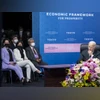)
IPEF is a 14-member group launched by US President Joe Biden over two years ago. | File Photo
India on Saturday signed key agreements focused on a clean economy, fair economy, and overarching arrangements under the United States (US)-initiated Indo-Pacific Economic Framework (IPEF) for prosperity.
The pacts were signed during Prime Minister Narendra Modi’s three-day visit to the US for the Quad Summit.
IPEF is a 14-member group launched by US President Joe Biden over two years ago with the aim of enhancing economic competitiveness and prosperity among member countries. The framework is structured around four pillars: trade (Pillar I), supply chain resilience (Pillar II), clean economy (Pillar III), and fair economy (Pillar IV).
India ratified the supply chain resilience agreement earlier this year in February and has maintained observer status for the trade pillar.
Apart from India, the 13 other members of IPEF are Australia, Brunei, Fiji, Indonesia, Japan, Korea, Malaysia, New Zealand, the Philippines, Singapore, Thailand, the US, and Vietnam.
Overarching Agreements
The overarching agreement is an administrative arrangement aimed at establishing an oversight ministerial-level mechanism. It seeks to facilitate the effective implementation of Pillars II, III, and IV. These pillars have the potential to enhance India’s productive capacity, integration into supply chains, and promote innovation, in line with its focus on becoming Atmanirbhar (self-reliant).
“This agreement seeks to establish a high-level political oversight framework at the ministerial level over the various individual IPEF agreements, while setting general guidance and goals, and guiding leaders’ vision and mandate for IPEF. It primarily includes administrative and institutional provisions,” the Department of Commerce said in a statement on Sunday.
“This agreement would provide identity to the group and longevity to the IPEF partnership by creating a formal mechanism and establishing a forum for ministerial discussions on emerging issues,” the statement added.
While the rest of the IPEF members had signed the overarching agreement during the grouping’s ministerial in June, India could not formally sign the pact as the domestic approval process was still underway.
The Union Cabinet gave approval for signing and ratifying the agreements related to the clean economy, fair economy, and the overarching IPEF agreement earlier this month.
Pillars III and IV
The clean economy pact aims to facilitate investments, project financing, including concessional financing, joint collaborative projects, workforce development, and capacity building for industries, particularly small businesses. It will also help further integrate Indian companies into global value chains, especially in the Indo-Pacific region.
“The agreement on the clean economy aims to promote technical cooperation, workforce development, capacity building, and research collaborations, and to facilitate the development, access, and deployment of clean energy and climate-friendly technologies. The goal is to collectively accelerate the efforts of IPEF partners towards energy security, energy transition, climate resilience, adaptation, and the mitigation of greenhouse gas (GHG) emissions,” the statement said.
The pact on the fair economy aims to create a “more transparent and predictable trade and investment environment” across the Indo-Pacific region.
To achieve these goals, IPEF partners will collaborate to enhance their efforts in preventing and combating corruption, including bribery, and supporting initiatives to improve tax transparency, the exchange of information, domestic resource mobilisation, and tax administration.
“It focuses on enhancing information sharing among partners, facilitating asset recovery, and strengthening cross-border investigations and prosecutions. This will also support India’s efforts in fighting corruption, money laundering, and terror financing,” the statement said.
First Published: Sep 22 2024 | 2:14 PM IST


































